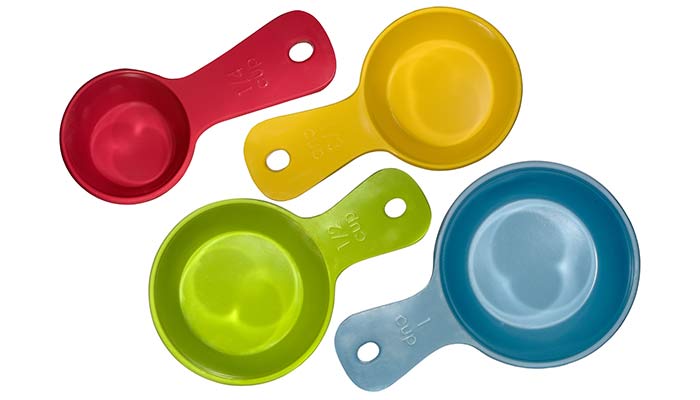Make Every Day Count
Helpful information for family caregivers
April/May 2022
Cooking for oneself is key for independence and self-esteem. If your loved one is hampered in the kitchen because of visual impairments, there is a lot you can do to help them retain their cooking ability. Who knows, you might even get a nice meal or a batch of cookies for yourself now and then! In our middle article we look at the topic of organ donation. It’s surprisingly easy to sign up for. This may be something your loved one might wish to consider. Last, are you looking for fun activities to stimulate a loved one with dementia? We suggest poetry as a way to unlock memories and joy. The Academy of American Poets has made poems available online specifically for this purpose.
Cooking tips for the visually impaired
 Is low vision making it harder for your loved one to cook? If food preparation has been one of their pleasures, they are probably grieving not only the change in their eyesight, but also the loss of creating and serving delicious meals. Even if cooking has not been a passion, the ability to safely prepare food for oneself is critical for maintaining independence and self-esteem.
Is low vision making it harder for your loved one to cook? If food preparation has been one of their pleasures, they are probably grieving not only the change in their eyesight, but also the loss of creating and serving delicious meals. Even if cooking has not been a passion, the ability to safely prepare food for oneself is critical for maintaining independence and self-esteem.
Fortunately, there are ways to empower your relative with simple strategies and inexpensive tools. Here are some techniques that augment and use all the senses. They also protect safety.
- Lighting. Identify workstations in the kitchen that could use extra lighting. Add a flexible arm lamp to shine a spotlight on the cutting board or on the recipe.
- Color and contrast. Use a white cutting board for dark foods (carrots, beets, meat) and a dark cutting board for light-colored foods (onions, chicken).
- Touch. Buy a “tactile pen.” These exude a liquid material that dries into easily felt lines, dots, numbers, or letters. Label measuring cups, “on/off” or other settings on appliances, and key positions for stove or oven dials.
- Sound. There are several “talking” devices for visually impaired cooks. For instance, a thermometer that speaks the temperature out loud. Or a device set at the edge of a bowl or measuring cup that beeps when liquid is near the top.
- Cut prevention. Use devices other than knives whenever possible. A vegetable peeler, for instance, or a cheese slicer or tomato/onion cutter. Another tip: The sharp edge of a knife blade is usually rounded. Rock the knife on the cutting board first. If it doesn’t rock easily, the cutting edge of the blade is likely pointing up.
- Burn prevention. Position the pan on the burner before turning on the heat. Similarly, turn off the burner before removing the pan. Wear short sleeves or sleeves rolled up so clothing doesn’t brush against burners and catch fire. For baking, get long oven mitts that cover the forearms. Also, pull the rack partially out when removing food, reducing the need to reach deep into the oven.
For those with a diagnosed low-vision condition, Medicare will pay for the services of a low-vision rehabilitation specialist. With a doctor’s referral, a specialist can come to the home and help your loved one identify easy adaptations that will make cooking—and other daily life activities—safe and enjoyable again.
Return to topOrgan donation
 Those who donate organs, eyes, or tissue leave a tremendous legacy, often the gift of life itself: Allowing someone a steady heartbeat. Or the vision to see a grandchild. Or healthy skin to cover a burn or cancer site.
Those who donate organs, eyes, or tissue leave a tremendous legacy, often the gift of life itself: Allowing someone a steady heartbeat. Or the vision to see a grandchild. Or healthy skin to cover a burn or cancer site.
National Healthcare Decisions Day (April 16) is when everyone is encouraged to create or update their advance directive. These end-of-life documents include a section for letting family members and healthcare providers know whether you choose to be an organ donor.
You are never too old to donate. The oldest donor on record was 92! You just indicate your preferences about donation. Then talk with your family to tell them of your wishes. When the time comes, doctors will determine which organs are or are not suitable.
Common questions
- Cost. There is no cost to donors.
- Medical care. Some people worry if they are on an organ donor list that they will not receive all the care necessary to save their life. Not true. Doctors will provide all the care you wish right up until death. That is the doctors’ oath.
- Open-casket funeral. The incisions are small, and funeral directors are skillful in making repairs. There is no disfigurement that would hinder an open-casket funeral.
- Choose what to donate. Donors can indicate ahead of time what they wish to donate.There are 10 organs that are suitable for transplant. And donation of skin tissue can impact up to 75 lives.
How to sign up. If your loved one is interested, go to organdonor.gov, the national registry. This group matches donors and recipients and provides instructions about what to do following a death. The person you care for can also have their donor status recorded through the state Department of Motor Vehicles so it can be put on their driver’s license or state ID.
Return to topPoetry and dementia
 If the person you care for has dementia, you may have noticed their withdrawal from conversations, movies, even from reading books or the newspaper. Anything with an involved plot line is now too difficult for them to follow.
If the person you care for has dementia, you may have noticed their withdrawal from conversations, movies, even from reading books or the newspaper. Anything with an involved plot line is now too difficult for them to follow.
Poetry, on the other hand, involves rhythm and images, which can stimulate memories of experiences, emotions, smells, tastes, and other sensations. All quite accessible by persons with dementia. Plus, many older adults went to school when poetry was an active part of the curriculum. Exploring fun poetry together may tap into positive memories from the past.
The Alzheimer’s Poetry Project has developed several ways to use poems as a window of connection.
If your loved one can still read
Consider printing out a few poems to read together. Read slowly enough that your relative can follow, but fast enough that the rhythm is evident. Even if they can’t read aloud, they can enjoy hearing the spoken words and following along. Shared reading provides a rare sense of belonging.
Ask questions drawing on the five senses
Poems with strong images work well. For instance, if you are reading A Red, Red Rose by Robert Burns, ask, “Were there roses in your garden?” “What does a red rose smell like?” “Did you ever get pricked by a thorn?” Or for Going Down Hill on a Bicycle by Henry Charles Beeching ask, “What was it like for you, riding a bike? Did you feel like you were flying?”
Humorous poems
Silly poems may resonate more than serious ones. (The Purple Cow) Or try limericks. They are often funny and the rhythm is infectious.
Finding poems
Do a Google search by topic, such as “tree poems,” or the name of a favorite poet. You can also find poems online at the Academy of American Poets.

